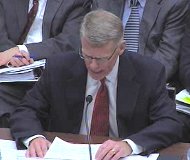Article from: www.thenewspaper.com/news/34/3472.asp
5/5/2011
House Transportation Committee Blasts Transportation Stimulus
US House Transportation Committee chairman expresses frustration with failure of $812 billion stimulus bill to create jobs.
 One of President Obama's signature achievements, passage of $812 billion in stimulus funds at the height of the recession, was labeled a failure by the chairman of the US House Transportation Committee, which had jurisdiction over about eight percent of the projects funded. In a hearing yesterday, Representative John Mica (R-Florida) explained that the money did not end up going to needed infrastructure projects.
One of President Obama's signature achievements, passage of $812 billion in stimulus funds at the height of the recession, was labeled a failure by the chairman of the US House Transportation Committee, which had jurisdiction over about eight percent of the projects funded. In a hearing yesterday, Representative John Mica (R-Florida) explained that the money did not end up going to needed infrastructure projects.
"This will go down in history as one of the greatest failures of a government program to stimulate the economy that mankind has ever created," Mica said. "This is a trillion-dollar lesson."
Initially, the idea behind the stimulus was to create a $250 billion package with the most of the funding going toward infrastructure projects. The total amount of the package more than tripled, but the funds for infrastructure dwindled to just $64.1 billion. Of that amount, only $27.1 billion went to highways and bridges.
"I could not be more frustrated by the results that I see," Mica said. "The total stimulus package was $787 billion and that's been re-evaluated to over $800 billion, and still we have a stagnating economy.... Many of the jobs created were very temporary jobs."
Committee Democrats defended the stimulus, suggesting the economy would have been in far worse shape had the money not been spent. Mica cited administrative problems with the spending. The Government Accountability Office (GAO) audited how effectively the Department of Transportation (DOT) disbursed grants, particularly for the high-speed rail and "TIGER" grants. Over $9.5 billion was handed out based on vague criteria.
"DOT cannot definitively demonstrate the basis for its award selections, particularly the reasons why recommended projects were selected for half the awards over highly recommended ones," Phillip R. Herr, director of physical infrastructure for GAO, testified. "Developing internal documentation is a key part of accountability for decisions, and DOT guidance states that officials should explain how discretionary grant projects were selected when projects with the highest priority in a technical review were not funded. The absence of documentation can give rise to challenges to the integrity of the decisions made, and DOT is vulnerable to criticism that projects were selected for reasons other than merit."
GAO also noted DOT's failure to measure the potential for long-term benefits when selecting projects.
 One of President Obama's signature achievements, passage of $812 billion in stimulus funds at the height of the recession, was labeled a failure by the chairman of the US House Transportation Committee, which had jurisdiction over about eight percent of the projects funded. In a hearing yesterday, Representative John Mica (R-Florida) explained that the money did not end up going to needed infrastructure projects.
One of President Obama's signature achievements, passage of $812 billion in stimulus funds at the height of the recession, was labeled a failure by the chairman of the US House Transportation Committee, which had jurisdiction over about eight percent of the projects funded. In a hearing yesterday, Representative John Mica (R-Florida) explained that the money did not end up going to needed infrastructure projects.